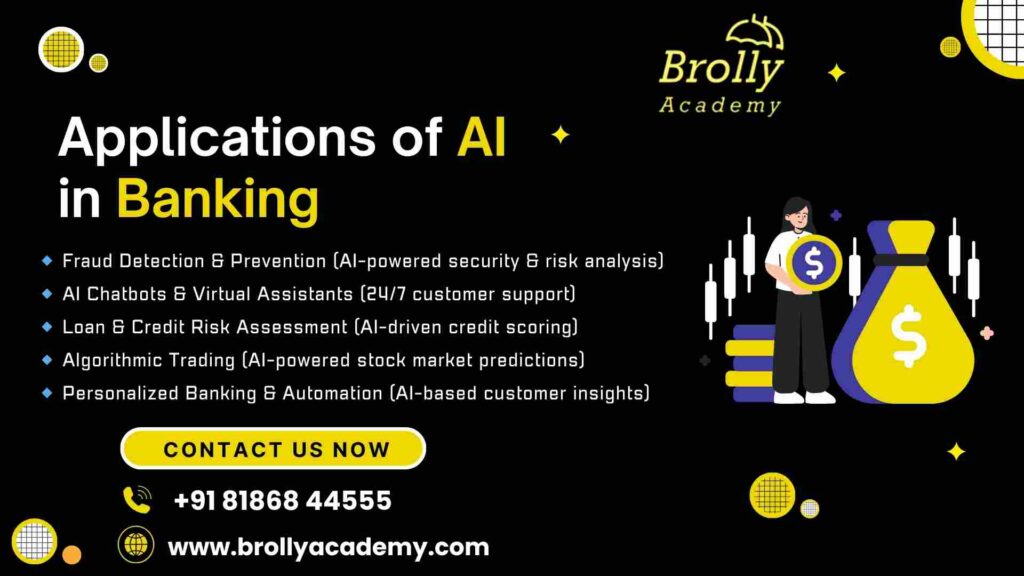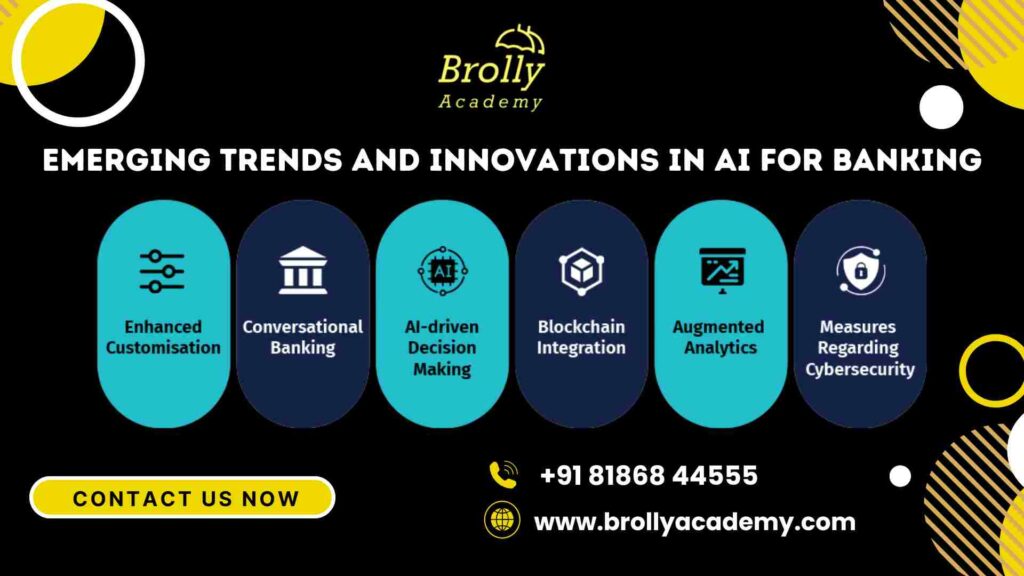Application Of AI In Banking
Explore the real-world applications of artificial intelligence in banking, from fraud detection to customer experience and risk management — with a special look at Indian banks.

Application Of AI In Banking
- Artificial Intelligence (AI) is transforming the banking industry by enhancing customer experiences, improving operational efficiency, and reducing risks.
- AI-powered chatbots and virtual assistants provide 24/7 customer support, while personalized financial recommendations help customers make informed decisions.
- Banks use AI for fraud detection by analyzing transaction patterns and identifying anomalies in real-time.
- Additionally, AI streamlines processes like loan approvals and credit scoring by automating data analysis, enabling faster and more accurate decisions.
- Overall, AI is revolutionizing banking by making services more efficient, secure, and customer-centric.
Overview of AI in Banking
- AI in banking refers to using advanced machine learning algorithms, automation, and data-driven insights to enhance banking services.
- From customer support to risk assessment, AI is reshaping traditional banking processes by enabling automation, reducing manual effort, and providing real-time decision-making capabilities.
Importance of AI in the Financial Sector
- Enhanced Security: AI-powered fraud detection systems analyze transaction patterns to identify suspicious activities and prevent financial crimes.
- Improved Customer Service: AI-driven chatbots and virtual assistants provide 24/7 customer support, answering queries and assisting with transactions.
- Efficient Risk Management: AI helps banks assess credit risk, detect anomalies, and prevent fraudulent transactions.
- Cost Savings: AI-driven automation reduces operational costs by minimizing human intervention in repetitive tasks.
- Regulatory Compliance: AI ensures adherence to financial regulations by automating compliance reporting and monitoring regulatory changes.
key Application of AI in Banking
- Artificial Intelligence (AI) has transformed the banking sector by introducing advanced technologies that automate processes, enhance security, and improve customer experiences.
- Various AI-driven technologies power modern banking operations, making financial institutions more efficient and responsive. Here are some of the most crucial AI technologies used in banking:
1. Machine Learning (ML)

Key Applications of ML in Banking
- Fraud Detection: ML models analyze transaction patterns to detect unusual activities and prevent fraudulent transactions in real-time.
- Credit Scoring: Banks use ML to assess an applicant’s creditworthiness based on historical financial behavior, improving loan approval processes.
- Customer Personalization: ML helps banks understand customer preferences and provide personalized recommendations for financial products.
2. Natural Language Processing (NLP)
Natural Language Processing (NLP) allows banks to understand and process human language, enabling seamless interactions between customers and financial institutions.
- Chatbots and Virtual Assistants: AI-driven chatbots use NLP to answer customer queries, assist with transactions, and provide financial advice.
- Sentiment Analysis: Banks analyze customer feedback and social media sentiments to improve services and customer engagement.
- Automated Document Processing: NLP extracts important information from financial documents, making processes like loan approvals faster.
3. Robotic Process Automation (RPA)
- Automated Loan Processing: RPA speeds up loan approvals by automating document verification and risk assessment.
- Regulatory Compliance: RPA ensures that banks adhere to financial regulations by automating compliance reporting.
- Transaction Processing: RPA minimizes human intervention in routine banking transactions, reducing errors and improving accuracy.
4. Computer Vision
- Facial Recognition for Authentication: AI-driven facial recognition enhances security by allowing customers to authenticate transactions using their faces.
- Automated Document Verification: Banks use AI to verify identity documents such as passports and driver’s licenses, reducing fraud risks.
- ATM Surveillance: AI-powered computer vision detects suspicious activities at ATMs and alerts security teams in real-time.
5. Predictive Analytics
Key Applications of Predictive Analytics in Banking:
- Risk Assessment: AI predicts potential financial risks, helping banks take proactive measures to mitigate losses.
- Investment Insights: Predictive analytics analyzes market trends to provide investment recommendations to customers.
- Customer Retention: AI predicts customer churn and helps banks implement strategies to retain clients.

Applications of AI in Banking
Artificial Intelligence (AI) has revolutionized the banking sector by improving efficiency, security, and customer satisfaction. Financial institutions leverage AI-driven technologies to automate processes, detect fraud, manage risks, and enhance customer interactions. Below are the key applications of AI in banking:
1. Fraud Detection and Prevention
Fraud is a major concern in the banking industry, and AI plays a crucial role in identifying and preventing fraudulent activities. Machine learning algorithms analyze transaction patterns in real time to detect anomalies and suspicious behavior.
How AI Helps in Fraud Detection:
- Real-Time Monitoring: AI continuously monitors transactions to identify unusual activities, such as unauthorized access or abnormal fund transfers.
- Pattern Recognition: AI detects deviations from normal banking behaviors and flags potentially fraudulent transactions.
- Biometric Security: AI-powered facial recognition and fingerprint authentication enhance security in banking apps and ATMs.
Example: If a customer’s card is suddenly used in a foreign country without prior travel history, AI can instantly flag the transaction and request additional verification.
2. AI-Powered Chatbots and Virtual Assistants
AI-driven chatbots and virtual assistants provide 24/7 support to customers, improving response times and reducing operational costs.
Key Benefits of AI Chatbots in Banking:
- Instant Customer Support: Chatbots handle queries related to account balance, transactions, and banking services.
- Personalized Recommendations: AI analyzes customer preferences and suggests financial products based on their needs.
- Voice Banking: AI-powered voice assistants help customers perform banking operations using voice commands.
Example: Banks such as HDFC, SBI, and ICICI have implemented AI-driven chatbots, including EVA and SIA, to assist customers in real-time.
3. Risk Management and Credit Scoring
AI enhances risk assessment by analyzing large datasets to predict creditworthiness and financial risks.
How AI Enhances Risk Management:
- Credit Risk Analysis: AI evaluates customer credit history, spending behavior, and financial transactions to determine loan eligibility.
- Market Risk Prediction: AI helps banks assess potential financial risks, such as stock market fluctuations and economic downturns.
- Regulatory Compliance: AI automates compliance checks, ensuring adherence to banking regulations.
Example: AI-powered credit scoring models allow banks to approve loans faster by assessing an applicant’s financial history and predicting repayment likelihood.
4. Personalized Banking and Customer Insights
AI enables banks to offer personalized financial services based on customer behavior and preferences.
How AI Enhances Personalization:
- Customized Financial Advice: AI recommends investment options, savings plans, and credit offers based on customer data.
- Spending Analysis: AI categorizes spending habits and provides insights to help customers manage finances better.
- Targeted Marketing: AI predicts customer needs and suggests relevant banking products, improving engagement.
Example: AI-based financial apps like Mint and Cleo analyze spending patterns and provide budgeting suggestions.
5. Automated Loan Processing and Approval
AI speeds up the loan approval process by automating document verification, risk assessment, and eligibility checks.
AI’s Role in Loan Processing:
- Document Verification: AI scans and verifies identity proofs, income statements, and credit histories.
- Faster Approvals: AI-based underwriting models analyze financial data and approve loans instantly.
- Risk-Based Interest Rates: AI determines interest rates based on the applicant’s financial risk profile.
Example: AI-based lending platforms like ZestMoney and LendingKart offer instant loans with minimal paperwork.
6. Regulatory Compliance and Reporting
Compliance with financial regulations is critical for banks, and AI helps automate compliance monitoring and reporting.
AI’s Role in Regulatory Compliance:
- Automated Auditing: AI analyzes transactions and detects non-compliance with banking laws.
- Regulatory Updates: AI tracks changes in financial regulations and ensures banks adhere to new policies.
- Data Security: AI encrypts sensitive banking data to prevent breaches and cyber threats.
Example: AI-powered compliance tools help banks like JP Morgan and Citibank reduce regulatory risks.
7. AI in Investment and Wealth Management
AI-driven robo-advisors and predictive analytics enhance investment strategies and wealth management services.
How AI Improves Wealth Management:
- Robo-Advisors: AI-powered platforms like Betterment and Wealthfront provide automated investment recommendations.
- Market Predictions: AI analyzes stock trends, economic indicators, and investor sentiment to forecast market movements.
- Portfolio Optimization: AI suggests asset allocation strategies based on risk tolerance and financial goals.
Example: AI-driven trading platforms like E*TRADE and Robinhood use predictive analytics to guide investment decisions.
Benefits of AI in Banking : Application Of AI In Banking
- Enhanced Security: AI helps detect fraud by analyzing transaction patterns and identifying suspicious activities in real-time. It also strengthens cybersecurity with biometric authentication and advanced encryption techniques.
- Faster Transactions: AI speeds up banking operations by automating processes like fund transfers and payment processing. This reduces delays and ensures quick, seamless transactions for customers.
- Cost Reduction: By automating routine tasks, AI reduces the need for manual work, cutting down operational costs for banks. It also minimizes financial losses by preventing fraud and errors.
- Improved Customer Service: AI-powered chatbots and virtual assistants provide instant responses to customer inquiries. They operate 24/7, reducing wait times and improving overall customer satisfaction.
- Personalized Banking: AI analyzes customer behavior and financial history to offer tailored recommendations. This helps customers make better financial decisions and enhances their banking experience.
- Better Loan Approvals: AI evaluates credit scores and financial records quickly, making loan approvals faster and more accurate. It reduces human bias and ensures fair credit decisions.
- Efficient Risk Management: AI helps banks assess risks by analyzing market trends and customer data. This allows financial institutions to make informed decisions and avoid potential losses.
- Regulatory Compliance: AI automates compliance checks by monitoring transactions and ensuring adherence to banking regulations. This reduces the risk of penalties and legal issues.
- Enhanced Investment Strategies: AI-powered predictive analytics help customers and banks make smarter investment choices. It analyzes market trends and provides real-time insights for better financial planning.
- Seamless Automation: AI automates repetitive banking tasks such as document verification and account management. This boosts efficiency and allows bank employees to focus on more strategic activities.

Emerging Trends and Innovations in AI for Banking
- AI-Powered Voice Banking: Banks are integrating AI-driven voice assistants to allow customers to perform transactions using voice commands. This enhances accessibility and provides a hands-free banking experience.
- Hyper-Personalization: AI analyzes customer data to provide highly tailored financial products and services. This improves customer engagement by offering personalized investment plans, loan offers, and spending insights.
- AI in Fraud Detection: Advanced AI models continuously monitor transactions to detect and prevent fraudulent activities in real-time. Machine learning algorithms improve over time, making fraud prevention more accurate and effective.
- Automated Wealth Management (Robo-Advisors): AI-powered robo-advisors provide financial guidance and investment strategies based on customer risk profiles. These automated systems help individuals make informed investment decisions with minimal human intervention.
- Blockchain and AI Integration: AI is being used to analyze blockchain transactions for security and efficiency. This combination enhances transparency, fraud detection, and secure digital contracts in banking.
- AI in Credit Scoring: Traditional credit scoring methods are being replaced by AI-driven models that consider alternative data sources. AI evaluates spending habits, social behavior, and financial history to provide fairer credit assessments.
- Predictive Analytics for Market Trends: AI-driven predictive models analyze vast amounts of financial data to forecast market trends. Banks use these insights to offer better investment advice and risk management strategies.
- AI-Powered Chatbots with Emotional Intelligence: New AI chatbots are being designed to recognize emotions and respond accordingly. This enhances customer interactions by making conversations feel more human-like and empathetic.
- AI in Regulatory Compliance: AI automates compliance monitoring by analyzing regulations and ensuring all banking operations follow legal standards. This reduces compliance risks and prevents regulatory penalties.
- AI-Driven Loan and Mortgage Approvals: AI speeds up loan and mortgage processing by verifying documents, assessing risks, and providing instant approvals. This makes loan applications faster, more efficient, and less prone to errors.
Want to explore a career in AI or banking technology? 👉 Check out Brolly Academy’s AI and Data Science Courses for real-time projects and placement support.
Conclusion : Application Of AI In Banking
With increasing trends like AI-driven wealth management, voice banking, and blockchain integration, the future of banking is becoming more automated, secure, and accessible. As AI adoption grows, financial institutions must focus on responsible AI implementation, ensuring compliance, fairness, and transparency. The evolving role of AI in banking will not only enhance customer experiences but also revolutionize the way financial services operate in the digital age.
AI is no longer a futuristic concept—it’s a strategic enabler for banks to innovate, cut costs, and stay competitive. Whether it’s a startup fintech or a traditional bank, the integration of AI is redefining operations across the board.
For learners and professionals, understanding AI’s impact on banking opens doors to high-demand roles in data science, analytics, fintech engineering, and beyond.
- For a Complete overview, read How Artificial Intelligence is Reshaping Banking

